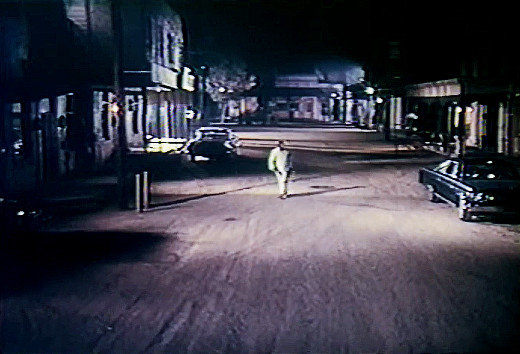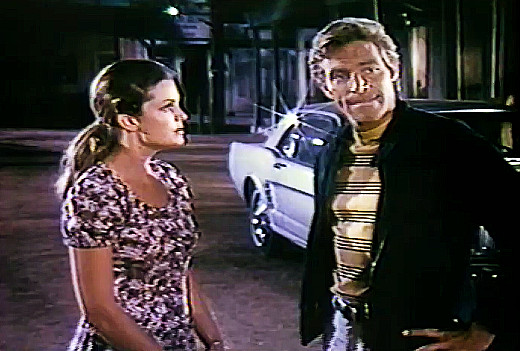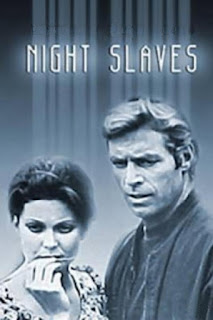Pros: Establishes an eerie, mysterious atmosphere in the first half; Solid cast headed by James Franciscus and Lee Grant
Cons: Reveal comes too early in the film and dissipates the suspense
James Franciscus plays Clay Howard, a business owner who is tired of the rat race and sells his share of the business to his partner. Shortly afterward he is involved in a car accident in which two people are killed and he is seriously injured, requiring a steel plate for his damaged skull.
Wracked with guilt, Clay takes off on a road trip with his wife Marjorie (Lee Grant), where they wind up at a bed and breakfast in a sleepy (in more ways than one) rural California town. That night, waking up from a nightmare, he goes to the window for some fresh air, where he sees crowds of people being herded onto trucks on the street below. He is startled to find his wife gone, and a mysterious girl (Tisha Sterling) sitting in the room, grinning from ear to ear. When the girl tells Clay that his wife is among those being loaded onto the trucks, he rushes downstairs to find out what’s going on. Marj seems to be in a trance, and when he tries to get her to come back with him, he’s yanked off the truck by one of the “handlers.”
Still in his pajamas, Clay wanders over to the Sheriff’s office, but finds the place completely deserted. The whole town seems to have been hauled off to some unknown destination in the middle of the night.
 |
| "They sure roll up the sidewalks early in this town!" |
Clay collapses back into bed. When morning comes and Marj is back with no memory of the night’s events, Clay almost convinces himself it was a bad dream, until he notices that his wife’s dress is covered in burrs and her shoes are filthy.
Now in full investigator mode, Clay visits the Sheriff (Leslie Nielsen), who listens politely but skeptically. After snooping around some more, he finds one of the trucks that carted off the townspeople, and discovers that the tires and rims are covered in mud and the same burrs he found on his wife’s dress.
As he snoops around, he asks everyone he meets how they’re sleeping, to his wife’s great embarrassment. Rather than clearing out of town, Clay decides he has to get to the bottom of the mystery, and decides to stay for a few more days. Clay’s sudden obsession is not helping his marriage, which is already dangling by a thread. To add to the mystery, a nondescript townie (Andrew Prine) seems to have taken an interest in Clay and is shadowing him.
The next night, Clay is on guard in their room. When the trucks come again, Marj falls into a trance and Clay has to physically restrain her from joining the sleepwalking crowd. Men suddenly appear in the room and take Marj by force.
Clay runs after the truck but can't catch it. The girl appears again and starts talking cryptically to Clay about her being an “engineer” who isn't allowed to love or have children. Clay thinks she’s nuts until she shows him something that causes him to doubt his own sanity.
 |
| The townspeople are ready for the fall hayseed ride. |
I first saw Night Slaves around the time of its debut, possibly the first broadcast or in the initial re-run (I was a big fan of ABC’s Movie of the Week). The concept of a whole town of sleep-walking residents being carted off in the middle of the night for some mysterious purpose was intriguing, to say the least.
Years later, possibly due to my own sleep problems, the story line popped into my head (although I had completely forgotten the movie’s title or who was in it). From time to time I would search the web to try to come up with the title, to no avail. Finally, a couple of years ago (and with a lot more time on my hands), I submitted what little I remembered of the plot to the experts on The Classic Horror Film Board, and sure enough, Night Slaves was the immediate reply. (Duh!)
As is often the case with these things, time has a way of stripping the luster off the elusive gems of your youth. It didn’t help that when I did get around to seeing it again, my only options at the time were blurry, muddy VHS transfers on YouTube and gray market DVD-R. (There are a couple of watchable copies on YouTube now.)
WARNING: POSSIBLE SPOILER AHEAD IF YOU KNOW YOUR ‘50S SCI-FI
Night Slaves definitely draws its inspiration from an early ‘50s sci-fi movie that, if I were to name it, and you knew anything about the plot, would be an obvious spoiler. (Okay, I’ll give you a hint: Ray Bradbury is credited as a co-writer.)
The ‘50s movie maintained an uncanny, spooky atmosphere throughout the film, and had the means to create a sense of awe and wonder with the climactic reveal. On the other hand, Night Slaves’ paltry budget precluded the sort of special effects that gave its predecessor such visual and dramatic flair. Night Slaves only has its high concept to sustain it, and ends up sputtering to a less than awesome conclusion.
As I pointed out in my review of The Love War, TV movies of the ‘70s were cranked out like B movies of the studio era, with small budgets and tight schedules. Sci-fi and horror-themed TV projects had to make due with leftover sets, familiar, easily accessible locations, and the barest of effects budgets. So concept, characters and plot were everything, and in the right hands, a small budget TV movie could generate big chills.
Night Slaves sets up a spooky atmosphere in its first half, but mitigates it to an extent with a soap-opera-ish love triangle involving Clay, Marjorie and the crazy girl. And then there’s the reveal that comes way too early in the film, further dissipating the suspense.
 |
| Clay can't believe there's no Starbucks in town. |
But don’t let that deter you too much. Night Slaves’ plot is sneakily subversive, especially considering that it was broadcast at the height of Cesar Chavez’s national fame leading the United Farm Workers on behalf of exploited migrant workers. In that context, Night Slaves jolts with its depiction of middle-class white people being herded onto trucks and hauled off to do some mysterious involuntary labor.
David Deal, in his book Television Fright Films of the 1970s, also appreciated the film’s counter-culture message, but from another angle:
“It is significant that Clay Howard wants to escape the slavery of materialism only to discover a people unknowingly enslaved to a much more devious master. It is also significant that he is immune from this slavery, explained by the metal plate in his head, but which could also be construed as his improved mindset.” [David Deal, Television Fright Films of the 1970s, McFarland, 2007, p. 109]
James Franciscus was a constant presence on TV from the late ‘50s through the ‘70s. His first recurring role was as a police detective on the gritty urban crime drama The Naked City (1959 - 1961). Through the ‘60s he did mostly guest appearances on shows like Wagon Train, The Twilight Zone and Alfred Hitchcock Presents. His career peaked in the late ‘60s and early ‘70s with appearances in several feature films including The Valley of Gwangi (1969), Marooned (1969) and Beneath the Planet of the Apes (1970), and a starring role as a blind private investigator in the short-lived TV series Longstreet (1971-72).
Trained in the theater, Lee Grant’s first break-out role came in Detective Story (1951; starring Kirk Douglas), for which she earned a best supporting actress Academy Award nomination (she would later go on to win the award for Shampoo in 1975). Unfortunately her career suffered a setback when she was caught up in the McCarthy-era Hollywood blacklist, but by the mid-60s she was back, winning an Emmy for her role in the hugely popular TV show Peyton Place (1966-67). In addition to Night Slaves, Grant appeared with James Franciscus in Marooned, playing an astronaut’s wife.
 |
| Marj and Clay ponder what they're going to say in their Yelp review. |
Director Ted Post was already a 20-year veteran when he made Night Slaves. Post directed episodes for some of the most beloved, classic series of all-time, including Perry Mason, Route 66, Wagon Train, Rawhide, The Twilight Zone and Columbo. Just after Night Slaves he directed Bing Crosby in Dr. Cook’s Garden, a TV movie cult favorite. His feature films include Hang ‘Em High and Magnum Force (with Clint Eastwood), and Beneath the Planet of the Apes (with James Franciscus).
Where to find it: Streaming


I've never heard of night slaves, but your review, Brian makes me want to see it! I've only seen James franciscus in beneath the planet of the apes, so it will be interesting to see him in something else.
ReplyDeleteI'm glad that I can bring some of these lesser-known TV movies to people's attention!
DeleteBrian, I really enjoyed reading your good write-up of NIGHT SLAVES(1970), because it brought back fond memories of the ABC MOVIE OF THE WEEK(1969-1975), which gave us some good quality made for television movies on those small budgets and tight schedules. The made for tv movie makers had to be creative and they were for the most part. I first viewed this entertaining tv movie back in the day.
ReplyDeleteMy first memories of James Franciscus were from his tv series MR. NOVAK(1963-65). Those were the days.
It's testimony to their creativity and originality that so many of these movies are remembered fondly even today, and fans keep uploading them to Youtube to keep them accessible. I had forgotten about Franciscus' series Mr. Novak, about an idealistic high school teacher (that's an occupation that doesn't get the TV drama treatment very often these days).
DeleteThanks for visiting!
Fascinating review, Brian, of a "lost" TV movie. It's too bad it didn't quite live up to your memories, but it does sound like an intriguing premise. I love the high-concept, low-budget approach of '70s TV movies, and this seems to one worth investigating futher. Thanks for bringing this one to light.
ReplyDeleteThanks Barry! I'm slowly but surely making progress on your challenge, and having a lot of fun looking at these "lost" movies. I'll be passing the baton on soon!
DeleteCan't say that I was aware of this one, but with a cast like this, I'm rather ashamed of that fact. I quite enjoy Franciscus (Valley of Gwangi and Cat O'Nine Tails being personal favorites) and have been a huge fan of Leslie Neilsen for years. Putting this near the top of my super-long watch list.
ReplyDeleteI've had a lot of fun with this series, writing about these nearly forgotten TV movies that were so impactful in my youth, and which have gotten new leases on life thru YouTube. I too am a big fan of Nielsen and Franciscus - Forbidden Planet is my favorite science fiction film of all-time, and right up there is Marooned, featuring both Franciscus and Lee Grant.
DeleteThis I have to see, Lee Grant is always great.. especially in Airport 77 and The 2nd Omen movie. Thanks for the review and the reminder to hunt this out...
ReplyDeleteYes, Lee Grant is always compelling no matter what the material. Check out YouTube to see if it's available in your location.
DeleteReally enjoyed this review and all the background information revving it up. The ABC MOVIE OF THE WEEK and for one season, The ABC MOVIE OF THE WEEKEND, we’re incredible showcases for some great films that utilized budget constraints to their advantage and focused more on imaginative writing and skilled performers over epic production values. They featured every genre imaginable and rarely disappointed in any of them. I’m glad to have found some decent, relatively watchable copies of these barely discovered gems on YouTube and can relive my teen hood experiences seeing them for the first time. Some, like DAUGHTER OF THE MIND and WHEN MICHAEL CALLS, are on YouTube in their original 90 minute European theatrical versions. For newcomers to these films, go exploring and find your minds basking in the rampant creativity of American television 50 years ago. I guarantee it will beat anything on today. And let’s see some more exceptional reviews of them on this site!
ReplyDeleteThank you so much! Like you, I've become addicted to looking up copies of these movies on YouTube, and you can be sure that I'll be doing more reviews like this.
Deleteseen the movie when I was young. Very haunting.
ReplyDeleteNight Slaves made a big impression on me too. Later on I remembered the movie but not the title, so it took some digging around to finally come up with the title and locate it on YouTube.
Delete